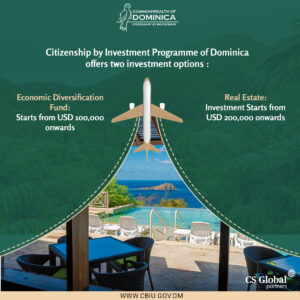Dominica paves path to reduce carbon footprints to fufil climate resilient aim
One such country is Dominica, which came back strongly from Hurricane Maria’s devastation in 2017.
22nd of June 2022

Roseau: Out of the 51 SIDS – Small Island Developing States, which are known to have similar geographical and cultural diversity, share similar economic and sustainable development challenges such as susceptibility to natural disasters and vulnerability to global developments.
The SIDS climate is highly influenced by ocean-atmosphere interactions, including hurricanes, monsoons, and tropical cyclones. SIDS are among the most vulnerable nations in the world to climate change due to their climatic characteristics and their socio-economic circumstances. Additionally, SIDS suffer from the impact of climate change despite being the least contributor to greenhouse gas emissions.
One such country is Dominica, which came back strongly from Hurricane Maria’s devastation in 2017. The government of Dominica made it a chance to rebuild better and pave the road for becoming the first climate-resilient country in the world.
Shortly after Hurricane Maria ripped through the nation, destroying more than 90 percent of the island’s structures and impacting 226 percent of the GDP, Prime Minister, Dr Roosevelt Skerrit addressed the 72nd United Nations General Assembly (UNGA) and boldly pledged to build a climate-resilient nation and reduce its dependence on fossil fuels.
In his impassioned speech, he challenged bigger nations to make bold steps in addressing global warming, as small nations like Dominica were on the receiving end of “thousands of storms that line up to pound us with maximum force and fury.”
Dominica, like many other SIDS, produces less than one percent of the total emissions that contribute towards global warming, yet they are facing more frequent and more severe storms setting back the progress the country has made to prosper and empower its citizens.
Shortly after the prime minister’s address to the UNGA, the Climate Resilience Execution Agency for Dominica (CREAD) was born, and it seeks to lead and coordinate strategic initiatives across all sectors in the country with the goal of leading the climate resiliency mission.
CREAD acts to bolster the ability of the business community, public services, and social sector partners to build strong and resilient communities, develop adaptive infrastructure, accelerate economic growth, strengthen institutional systems, enhance Dominicans’ capacity to respond to the local impacts of global climate change, and set an example for the rest of the world on how to respond to the challenges of a changing climate.
As part of CREAD, Dominica also issued a climate resilience policy framework to guide its recovery journey in the form of the National Resilience Development Strategy 2030 (NRDS).
The NRDS articulates and outlines 43 resilience goals aimed at ensuring that development is people centred. It stipulates that, at the highest level, the Climate Resilience and Recovery Plan (CRRP) should reflect three pillars of resilience, namely: Climate Resilient Systems, Prudent Disaster Risk Management Systems, and Effective Disaster Response and Recovery.
The country, which can be counted amongst the few nations that can be termed “carbon neutral” is enhancing its resilience agenda by utilising resources on the island to generate energy.
It has already undertaken several projects that will help it achieve climate resiliency.
Rebuilding to climate-resilient standards costs the country 25 percent more than traditional methods.
The IMF began working with Dominica to understand the probability and intensity of natural disasters, as well as the costs and benefits of building to new standards. Armed with a new framework and strategy, the government launched on a path to become the world’s first nation resilient to hurricanes, earthquakes, and other natural disasters.
Efforts are focused on upgrading and expanding the road network, including making bridges higher to allow for water and debris overflow, building resilience into the housing sector, and upgrading hospitals and health centres. Investments also support resilient agriculture for food security, education, reforestation, and community preparedness training, among other things.
So far, the country has been providing climate-resilient houses, hospitals, and health care facilities, and hurricane shelters in all communities island wide.
Over 1 000 climate resilient houses have been given to residents in various regions, including Cotton Hill, Roseau City Square, Bellevue Chopin, Georgetown, Jimmit, Castle Bruce, San Sauveur, Grand Fond, La Plaine, and Delices.
The government aims to build 5 000 new modern, climate-resilient homes for affected families, along with community facilities, health centres and modern infrastructure.
The construction of a geothermal plant, in partnership with the United Kingdom and the World Bank is almost complete. The plant is expected to be operational by 2023 and will enable the country to reduce its reliance on fossil fuels.
The plant will ensure that the country is powered by renewable energy, reducing energy costs and carbon emissions while simultaneously creating jobs.
The country is also building an international airport in partnership with Montreal Management Consultant Establishment (MMCE) and upon completion, the airport will be equipped with air bridges and meet Dominica’s new resilience construction standards.
Micha Emmet, CEO of the world’s leading government advisory and marketing firm, CS Global Partners says, “For a small nation, Dominica has taken bold steps to ensure its sustainability while combating the impact of global warming. What the country has managed to do, building back better and stronger, from its own resources is quite remarkable and the nation must be commended for being so resilient.

“With that said, global warming and climate change remain the responsibility of every nation and we constantly need to hold each other accountable in ensuring we meet the Paris Agreement targets.”
Latest
- Man injured in Belize City shooting, one detained
-
St Kitts and Nevis Government secures Frigate Bay lands for development and citizen ownership -
Saint Lucia Cruise Port to welcome thousands of tourists from February 16-22, boosting local economy -
St Kitts and Nevis to commission Basseterre Desalination Plant on February 24 -
West Indies Women to host Sri Lanka in Six-Match Series in Grenada
Related Articles

12th of December 2024

8th of December 2024

7th of December 2024


25th of November 2024

25th of November 2024

24th of November 2024

